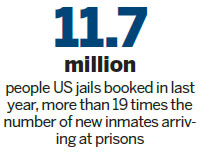US jails struggle to care for mentally ill

Facilities not keeping up with growing number of inmates needing treatment
Many of the 3,300 jails across the US have seen a rise in the number of inmates with serious mental illnesses, most arrested for nonviolent crimes. In many cases, they have become treatment centers of last resort.
The jails are awash in a tide of booking and releases that make them particularly unsuited for the tasks of screening for mental illness, managing medications, providing care and ensuring inmate safety.
Unlike prisons - where inmates serve extended sentences - jails hold those trying to make bail while awaiting trial, or who are serving shorter terms. US jails hold about 731,000 people, less than half the 1.57million in state and federal prisons. But last year, jails booked in 11.7million people more than 19 times the number of new inmates arriving at prisons.
"Jails are churning people," said Henry J. Steadman, a consultant to government agencies on how courts and correctional facilities deal with people with mental illnesses.
Experts have pointed to rising numbers of inmates with mental illnesses since the 1970s, after states began closing psychiatric hospitals without following through on promises to create and sustain comprehensive community treatment programs.
But as the number of those with serious mental illnesses surpasses 20 percent in some jails, many have struggled to keep up, sometimes putting inmates in jeopardy.
The Associated Press has reported that at least nine of the 11 suicides in New York City jails over the past five years came after operators failed to follow safeguards designed to prevent inmates from harming themselves. The AP's investigation into the deaths of two mentally ill inmates at the city's Rikers Island complex - one who essentially baked to death in a 38 C cell in February, and the other who sexually mutilated himself last fall-have prompted promises of reform.
Federal law protects the rights of people in jails and other institutions. But in temporary holding facilities, dealing with serious long-term mental illnesses requires operators to rethink what they do, said Thomas J. Dart, sheriff of Cook County, which includes Chicago.
"You're given a court order by a judge to hold this person in the jail until you're told not to," Dart said. "You're not supposed to do anything other than feed him, give them a bed, make sure they don't harm anyone else or themselves. ... You're not in there trying to cure people."
The numbers, posted daily on the Cook County sheriff's website, would be alarming at an urgent care clinic, let alone a jail: On a Wednesday, 36 percent of all new arrivals report having a mental illness. On a Friday, it's 54 percent.
Many jails are dealing with similar dynamics, with sometimes disturbing results.
In June, federal officials cited "deplorable" conditions for mentally ill inmates in the Los Angeles County jails as partly to blame for 15 suicides in 30 months. The Los Angeles system, the country's largest with 19,000 inmates, has been under federal supervision since 2002, but still fails to adequately supervise inmates "with clearly demonstrated needs", the Justice Department concluded.
In Pensacola, Florida, Justice officials last year issued a scathing report about conditions at the Escambia County Jail. Records showed many inmates who requested care were never seen by a mental health professional. When inmates refused to take medications, the jail merely removed them from its list of those with a mental illness.
Researchers long warned mental illness was being "criminalized", as police arrested more people for low-level offenses.
In the 1980s, researchers found about 6 percent of inmates showed signs of serious mental illness. A survey published in 2009 found 17 percent of jail inmates with serious mental illnesses. Individual jails report far greater numbers. Today, many of those jailed with mental illnesses have grown up in a system full of holes.
"Even what we had when I started doing this work in 1988 was better than what we have now," says Nancy Koenigsberg, legal director for Disability Rights New Mexico, which helped bring suit against her state's Dona Ana County Detention Center in 2010 for mistreating mentally ill inmates.
(China Daily 07/15/2014 page10)














